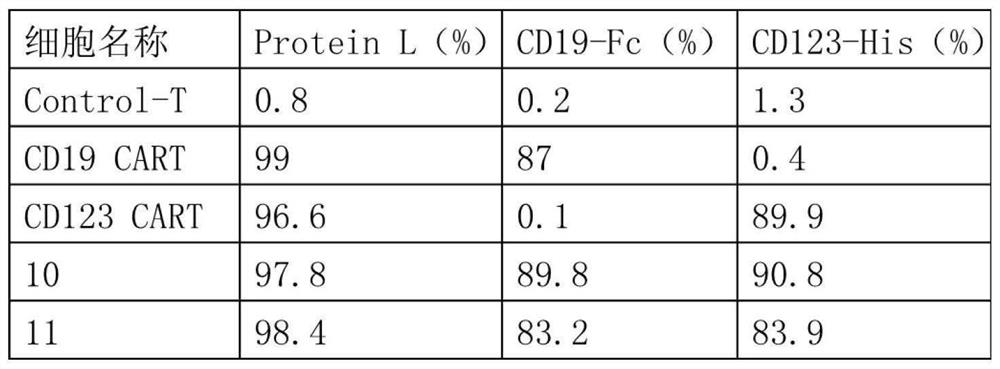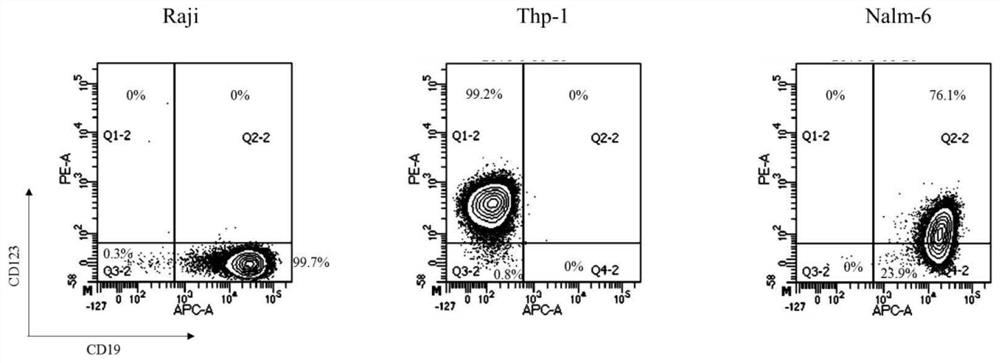Double-target chimeric antigen receptor targeting CD19 and CD123 and application of double-target chimeric antigen receptor
A chimeric antigen receptor and dual-antigen technology, which is applied in the field of bispecific chimeric antigen receptor and CAR-T cells, can solve the problems that CAR vectors are difficult to transduce T cells, CAR transduction ability is different, recurrence, etc. Achieve the effects of reducing the risk of tumor immune escape, high CAR transduction efficiency, and easy virus preparation
- Summary
- Abstract
- Description
- Claims
- Application Information
AI Technical Summary
Problems solved by technology
Method used
Image
Examples
Embodiment 1
[0044] Example 1: Plasmid Construction
[0045] designed as figure 1 The CAR structure shown, the nucleic acid sequence is shown in SEQ ID NO: 1 or SEQ ID NO: 2, the fragments were cut and recovered by double enzyme digestion, the gene fragments were connected, transformed and single cloned, and the vector numbers obtained were respectively 10 , 11. The CAR structural element comprises: a nucleotide sequence such as SEQ ID NO:3, an amino acid sequence such as SEQ ID NO:10 targeting CD19 ScFv; a nucleotide sequence such as SEQ ID NO:4, and an amino acid sequence such as SEQ ID NO:11 ScFv targeting CD123; nucleotide sequence such as SEQ ID NO:5, amino acid sequence such as the hinge hinge structure of SEQ ID NO:12; nucleotide sequence such as SEQ ID NO:6, amino acid sequence such as SEQ ID NO:13 Transmembrane structure; nucleotide sequence such as SEQ ID NO:7, amino acid sequence such as the intracellular costimulatory domain of SEQ ID NO:14, nucleotide sequence such as SEQ ID...
Embodiment 2
[0047] Example 2: Preparation of lentivirus and infection of T lymphocytes
[0048] In this example, the calcium phosphate method was used to package the lentivirus, specifically: 293T cells were cultured to a better state with DMEM medium containing 10% FBS (w / v), and the packaging plasmid (RRE:REV:2G) and expression plasmid Add the scale to a 1.5 centrifuge tube, add CaCl2 and 2× HBS, mix well, let it stand at room temperature, then add it to the treated 293T cell culture medium, and change the medium again to 10mL DMEM containing 10% FBS after 3-5h Culture medium, after 48h or 72h, the cell supernatant was collected, the virus was purified, and the titer was determined.
[0049] Titer table:
[0050]
[0051] The prepared lentivirus was used to infect CHO cells, and the CD19CART, CD123CAR-T, double CART10 and double CART11 infected CHO cells were labeled with CD19-FC, CD123-His (Acro, 1741d-971F1-NZ) flow cytometry labeling reagents and detected The expression of CD19-...
Embodiment 3
[0054] Example 3: Target cell preparation and target antigen detection
[0055] The cultured target cells Raji, Thp-1, and Nalm-6 were prepared as Luc-labeled target cells by lentivirus infection with Luc-GFP virus, and anti-CD19-FC, CD123-His (Acro, 1741d-971F1-NZ) Detection of target cell surface antigen expression. see results image 3 Shown: Raji is only CD19 positive cells, Thp-1 is only CD123 positive cells, Nalm-6 is CD19 and CD123 double positive cells.
PUM
 Login to View More
Login to View More Abstract
Description
Claims
Application Information
 Login to View More
Login to View More - R&D
- Intellectual Property
- Life Sciences
- Materials
- Tech Scout
- Unparalleled Data Quality
- Higher Quality Content
- 60% Fewer Hallucinations
Browse by: Latest US Patents, China's latest patents, Technical Efficacy Thesaurus, Application Domain, Technology Topic, Popular Technical Reports.
© 2025 PatSnap. All rights reserved.Legal|Privacy policy|Modern Slavery Act Transparency Statement|Sitemap|About US| Contact US: help@patsnap.com



